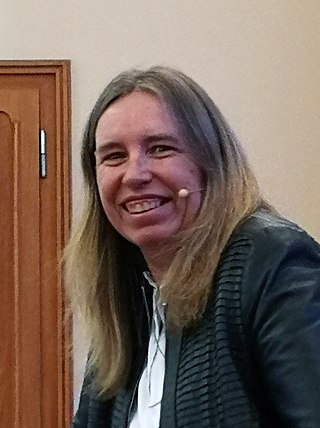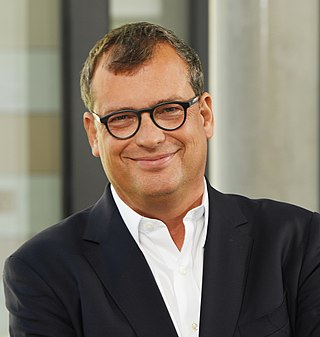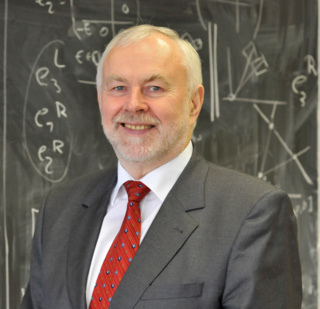
Wolfgang Peukert (born 9 June 1958 in Karlsruhe) is a German process engineer. He won the Gottfried Wilhelm Leibniz Prize in 2005.

Wolfgang Peukert (born 9 June 1958 in Karlsruhe) is a German process engineer. He won the Gottfried Wilhelm Leibniz Prize in 2005.
Wolfgang Peukert studied chemical engineering at the University of Karlsruhe and received his doctorate in 1990 at the Institute of Mechanical Process Engineering with the topic "The combined separation of particles and gases in packed bed filters". After seven years in the development department of the Japanese Hosokawa Group, he became a full professor at the Institute of Particle Technology, Technical University of Munich (TUM) in 1998. He moved to the Institute of Particle Technology at the Friedrich-Alexander University Erlangen - Nürnberg, Chair and full professor, in 2003.
Prof. W. Peukert works and shapes the scientific field of particle technology. [1] Starting from filed of mechanical process engineering, he develops particle technology into an interdisciplinary field of research. By combining the working methods of physics, chemistry and process engineering, individual processes and process-structure-property relationships are fundamentally investigated.
Using experimental, analytical and theoretical methods, he mainly studies particles with sizes in the submicrometric and nanometer range, where the surface properties have a greater influence than the volume properties. The field of research is covering particle synthesis and formation, interface engineering, characterization of particles, particle interactions and structure formation and product design.
W. Peukert is member and coordinator of several research initiatives and invited plenary and keynote speaker at major international conferences. [2]

Gottfried Wilhelm Leibniz University Hannover, also known as the University of Hannover, is a public research university located in Hanover, Germany. Founded on 2 May 1831 as Higher Vocational School, the university has undergone six periods of renaming, its most recent in 2006.

The Gottfried Wilhelm Leibniz Prize, in short Leibniz Prize, is awarded by the German Research Foundation to "exceptional scientists and academics for their outstanding achievements in the field of research". Since 1986, up to ten prizes are awarded annually to individuals or research groups working at a research institution in Germany or at a German research institution abroad. It is considered the most important research award in Germany.
Norbert Peters was a professor at RWTH Aachen University, Germany and one of the world-wide authorities in the field of combustion engineering. He headed the Institut für Technische Verbrennung (Institute for Combustion Technology). Born in Linz, Austria, he was educated at the Karlsruhe University of Technology and later at the Technical University of Berlin. He worked in Rourkela Steel Plant for six months.
Theo Geisel is a German physicist. Geisel is a director at the Max Planck Institute for Dynamics and Self-Organization and professor of theoretical physics at the University of Göttingen. His research is primarily concerned with the behavior of complex systems ranging from theoretical investigations in quantum chaos to nonlinear phenomena occurring in the brain.

Anja Feldmann is a German computer scientist.
Leif Kobbelt is a German university professor for Computer Science with a specialization in Computer Graphics. Since 2001 he is the head of the Institute for Computer Graphics and Multimedia at RWTH Aachen university.
Peter Sanders is a German computer scientist who works as a professor of computer science at the Karlsruhe Institute of Technology. His research concerns the design, analysis, and implementation of algorithms and data structures, and he is particularly known for his research on suffix sorting finding shortest paths in road networks.
Peter Gumbsch is a German physicist and materials scientist. He is the director of the Fraunhofer-Institut für Werkstoffmechanik IWM, in Freiburg, Germany and professor for mechanics of materials at the Karlsruhe Institute of Technology (KIT).

Gerald H. Haug is a German geologic climatologist, prize winner of the Gottfried Wilhelm Leibniz Prize and since 2007 he has a professorship at the ETH Zürich in Switzerland. In 2015 he became director of the Climate Geochemistry Department and Scientific Member at the Max Planck Institute for Chemistry in Mainz and since March 2020, he became the new President of the National Academy of Sciences Leopoldina.

Martin Grötschel is a German mathematician known for his research on combinatorial optimization, polyhedral combinatorics, and operations research. From 1991 to 2012 he was Vice President of the Zuse Institute Berlin (ZIB) and served from 2012 to 2015 as ZIB's President. From 2015 to 2020 he was President of the Berlin-Brandenburg Academy of Sciences and Humanities (BBAW).

Bernhard Wilhelm Roth is a German experimental physicist.
Stefanie Dehnen is a German chemist. She is the executive director of the Institute of Nanotechnology at the Karlsruhe Institute of Technology. From 2006 to 2022, she was a full professor for inorganic chemistry at the University of Marburg. She has received numerous awards for her research in inorganic chemistry.
Stefan Grimme, is a German physical chemist; he completed a Ph.D. thesis on photochemistry at Technical University of Braunschweig in 1991; he is a professor at the Universität Bonn since 2011 who is active in the field of computational chemistry; he was elected a member of the Academy of Sciences Leopoldina in 2018.
Britta Nestler is a German materials scientist at the Karlsruhe Institute of Technology. Her research involves the development of software to simulate the formation of microstructures in advanced materials for which experimental studies would be too expensive or difficult.
Jürgen Rödel is a German materials scientist and professor of non-metallic inorganic materials at the Technische Universität Darmstadt.
Ulrich Aloysius Konrad is a German musicologist and professor at the Institute for Music Research of the University of Würzburg. He is considered an expert on European music of the 17th to 20th centuries, especially the works of Mozart, Robert Schumann, Richard Wagner and Richard Strauss. He wrote a biography, Wolfgang Amadé Mozart, and studied the composer's sketches.
Eduard Arzt is an Austrian physicist and materials scientist. He is the recipient of the Gottfried Wilhelm Leibniz Prize, the highest research award of the German Research Foundation (DFG), the Acta Metallurgica Award, and the Heyn-Award, the highest award of the German Materials Society (DGM). He is a member of the German Leopoldina Academy of Sciences in Halle, and a corresponding member of the Austrian Academy of Sciences in Vienna. In 2020, Arzt was elected an international member of the US National Academy of Engineering

The TUM School of Natural Sciences (NAT) is a school of the Technical University of Munich, established in 2022 by the merger of various former departments. As of 2022, it is structured into the Department of Biosciences, the Department of Chemistry, and the Department of Physics. The school is located at the Garching campus.